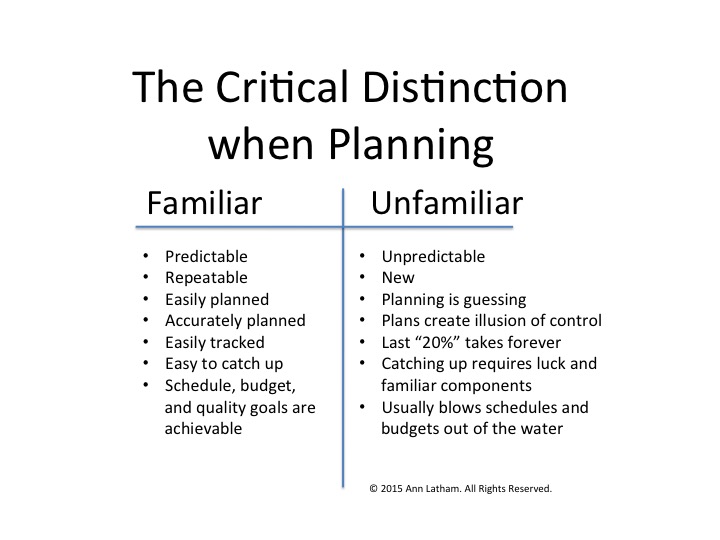An ounce of planning is worth a pound of rework.
If you’ve ever:
- Wasted time on a wild-goose trail that turned out to be irrelevant to your goals
- Built something that wouldn’t fit
- Been stuck waiting for something that no one thought to do
- Been a day late and a dollar short
You know that insufficient planning can lead to tremendous delays, wasted money, and great frustration.
But do you also know that accurate, complete, and detailed plans can be counter-productive?
Consider this critical distinction: familiar work versus unfamiliar work. 
As the chart shows, familiar work is predictable. Thus, it is easy to plan in significant and accurate detail. It is easy to track for the same reason. The team plows through the work, overcomes obstacles, and knows how to make up for lost time. In many cases, the work is so familiar the plan is barely necessary.
But when you apply these same principles to unfamiliar work, all you get is trouble.
1. Creating the Illusion of Control
Efforts to create complete, detailed, and accurate plans lead to great looking guess work. These plans create the illusion of control. The resulting fiction looks every bit as convincing as those familiar and predictable plans. If you fall into the trap of believing that this fiction means something, you are in trouble.
2. The Plan Becomes the Objective
If you are determined to create high quality plans, you will inevitably spend more time on the familiar portions of the tasks ahead than you will on the unfamiliar portions. The familiar work is easier to plan, less stressful, and more satisfying. You can make those plans nearly perfect with enough effort!
And that is the problem!
Meanwhile, there is nothing satisfying about creating detailed fiction or leaving the plan filled with amorphous placeholders. Thus, the unfamiliar work gets the short end of the stick when it comes to your planning time and energy.
3. Too Driven by Results
Once your work is underway, you want to be sure to stay on plan. You need to show good progress or you will attract unwanted attention. So where do you focus?
On the familiar work, of course. The low hanging fruit. The tasks you can finish quickly and check off the list.
Meanwhile, those amorphous blobs of unknowns are going nowhere!
4. Ambushed!
Most projects speed along smoothly until they are 80% complete. That’s 80% of the itemized tasks and nearly 100% of the familiar work. Suddenly the unknowns loom large. Those who have peeked inside the amorphous blobs are panicking quietly and working in desperation. They know they are in trouble and hope they can perform a miracle before they become a blemish on the nice orderly plan showing steady progress.
Meanwhile, management can’t figure out why the final 20% always takes 80% of the time! They don’t see that their planning methods focus the energy on the familiar work while it is the unfamiliar work that routinely blows the schedule, budget, and quality goals out of the water.
Planning to Learn
To avoid these traps, you must manage familiar work differently from unfamiliar work:
- Separate the familiar tasks from the unfamiliar tasks up front.
- Resist the urge to make beautiful, fictitious plans. For familiar work, you may not need that detail. For unfamiliar work, it will only be fiction.
- Focus early on the learning that will make the unfamiliar familiar.
- Create milestones that reflect critical learning.
- Replace questions such as “Are we on schedule?” with:
- What have we learned since we last talked?
- How should that affect next steps?
- What do we still have to learn?
- Where are you confident and where are you worried?
- How do you know you can finish on time?
- Mark progress, not simply by checking off tasks, but by the growing confidence of those doing the work that they have uncovered the last obstacles, are learning fast enough, and believe they will finish on time.
Don’t let the illusion of control and desire for smooth progress distract you from focusing on the real obstacles that are waiting in ambush!


Comments are closed.